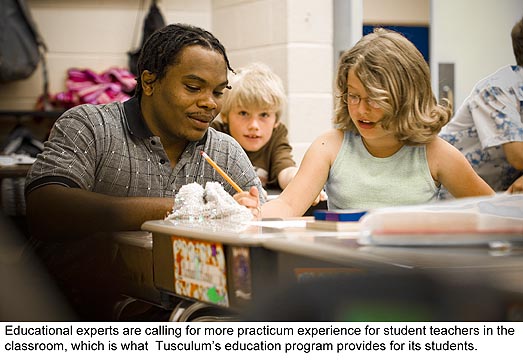 With its focus on clinical hours and practical experience, the Tusculum College teacher education programs are in the limelight as national publications have recently called out for more programs at institutions of higher education like the ones offered at Tusculum College.
With its focus on clinical hours and practical experience, the Tusculum College teacher education programs are in the limelight as national publications have recently called out for more programs at institutions of higher education like the ones offered at Tusculum College.
Recent articles in the “Wall Street Journal” and the “Chronicle of Higher Education” have addressed teacher training and more focused on clinical instruction and hands-on experiences in the classroom.
“Students in the Tusculum College education programs have the opportunity for field experience from the very first course they take,” said Dr. Lisa Johnson, director of the College’s School of Education and assistant professor of education.
In the November 15 edition, the “Chronicle of Higher Education” ran an article by writer Kevin Kiley calling for teacher-training programs to be “revamped to focus more on hands-on, clinical instruction, similar to how doctors are trained.” A related article in the November 16 issue of the “Wall Street Journal” announced a panel of education experts’ assessments that that teacher education programs should “operate more like medical schools, which rely heavily on clinical experience.”
At Tusculum College, the new model is already in place, with a program that provides more than 200 clinical hours of hands on experience in a classroom before a student even reaches the point of doing their student teaching, according to Johnson.
“With the development of the unique block program offered at Tusculum College, the teacher education programs evolved as well,” said Johnson. “Because of the way our classes are taught, we are able to get our students inside a classroom sooner, more often and with excellent success rates.”
Johnson added that there is a clinical aspect to every education course taught in the Tusculum education program and that because of this, advisors and supervisors are much more easily able to determine if a student is actually ready for their student teaching program.
The road to developing the program has not been easy, partnerships with local and regional schools systems have been essential, and those partnerships must be maintained constantly, said Johnson.
“With the large number of students we have in both our Residential and adult education programs, maintaining relationships with the local school systems that provide learning opportunities for our students is vital,” she added. “We have been continually blessed to have worked out relationships that benefit our students as well as the schools in which they serve.”
According to Pauletta Johnson, director of field experience and assistant professor of education, presently Tusculum College’s School of Education has partnerships with more than 20 area school systems, totaling 93 schools. The relationships with the schools are fostered by the school administrator’s willingness to allow Tusculum students to participate in the learning process within the school setting.
“This is a reciprocal partnership as it allows additional support to the learning environment, while allowing Tusculum students to gain valuable experience and knowledge,” said the field experience director. In addition, she said, field experience supervisors complete regular visits to ensure the school is pleased with the progress of each practicum student and student teacher.
Sandy Williams, principal of Keplar Elementary in Hawkins County, has worked with students through the Tusculum College program for several years and has great appreciation for the effort the program makes to provide clinical, hands-on classroom hours for its students prior to their going into their own classroom as a student teacher.
“Those extra clinical hours are hands-on and students learn how to teach,” said Williams. “It’s so important, not only that students find out where their heart is, but that they get to work with a variety of age groups, in various school districts, various subject areas and it can refine their skills.”
In addition Williams said that when it came to interviewing for teaching positions, she will always pull out resumes of those students who went to Tusculum College and review them first because she knows the amount of actual classroom experience these candidates have already had.
“It’s a real advantage over those candidates whose only classroom time has been a student teaching position.”
One of the criticisms of the teacher education program is that in most programs, students spend only about 10-12 weeks observing teachers or student-teaching themselves, according to the “Wall Street Journal” article.
At Tusculum College, students are required to complete a minimum of 198 hours of practicum in the classroom before the student teaching semester. In addition, student teachers are required to complete full school days for a minimum of 15 weeks. This results in over 800 hours of teacher preparation time before obtaining a license.


